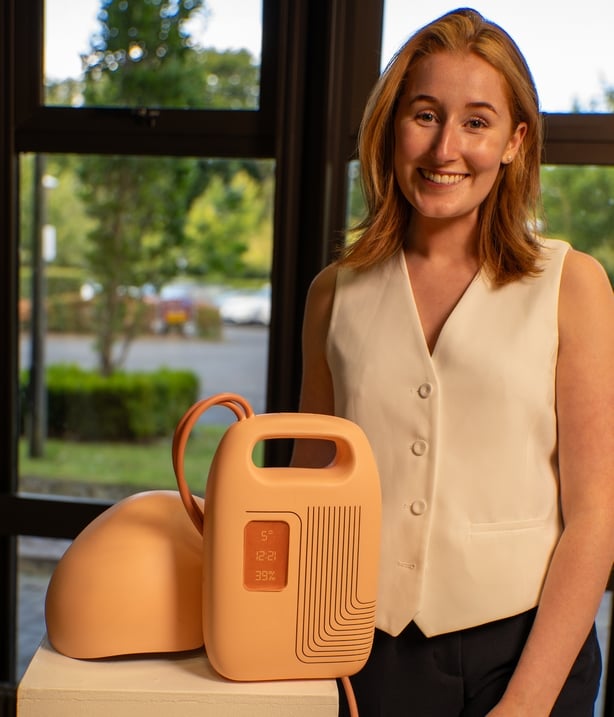University of Limerick graduate Olivia Humphreys has been named as the Irish national winner of the James Dyson Award 2024.
Her invention "Athena" has scooped the top prize in Ireland, winning €5,800 from the James Dyson Foundation.
Athena is a portable, thermoelectric battery-operated scalp-cooling device for people undergoing chemotherapy treatment.
Scalp-cooling can help prevent hair loss by shrinking the blood vessels with the application of cold temperatures to the scalp during chemotherapy treatment.
Athena is designed to be more cost-effective and time-saving than hospital models without compromising on the quality.

It consists of a carry case and a cooling helmet and aims to provide a more accessible, yet effective option for scalp-cooling, enabling people to spend less time in the hospital on a chemotherapy infusion day.
Olivia Humphreys witnessed first-hand how much of an impact chemotherapy-induced hair loss can have on a person when her mother was affected by cancer in 2019.
From spending time with her during treatment experience, Ms Humphreys noticed the shortage of scalp-cooling machines in the hospital her mother was in, as well as how limited the existing solutions were.
Athena works by utilising low-cost thermoelectric semiconductors to cool a tank of water which is then circulated around the head through a headpiece.
The battery-powered device allows patients to bring it home and control it themselves, making it more accessible to the consumer market.
The estimated cost for Athena would be around €1,000, according to Ms Humphreys, compared to industry machines which come in at around €40,000 or more.
Athena at full battery power, can run for three-and-a-half hours, allowing the patient to commute to and from the hospital while cooling and move around during infusion.
"To elevate Athena to the next level, extensive research and development is required," Ms Humphreys said.
"While working on this project, I have been fortunate to network with Luminate Medical, a company in Galway, dedicated to building a better future for cancer care"
"They have extended an internship offer to me as a research and development engineer," she added.
Lead Design Engineer at Dyson James Gilchrist, who was part of the judging panel, said that the genius of Athena is not just in increasing access; it is in taking the patient out of the clinic.
"Instead of spending an extra two hours in the treatment centre, Athena allows patients to precool their scalp on the way there and continue the cooling process post-treatment in the comfort of their own home," Mr Gilchrist said.
Athena will now progress to the international stage of the James Dyson Award and Ms Humphreys will aim to commercialise the product by producing a fully functional, technologically integrated prototype.
The international top 20 shortlist will be announced on 16 October and the international winners on 13 November.
The awards, run by the charitable foundation of billionaire inventor James Dyson, recognise novel inventions that tackle a pressing real-world problem.
The competition is for engineering and design students and recent graduates, with a focus on ambitious designs that address a global issue.







